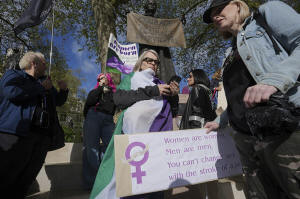UK Supreme Court rules that equalities law defines a woman as someone
born biologically female
[April 16, 2025]
By BRIAN MELLEY, JILL LAWLESS and SYLVIA HUI
LONDON (AP) — The Supreme Court ruled Wednesday that the U.K. equalities
law defines a woman as someone born biologically female, rejecting the
Scottish government's argument that it includes transgender women.
Justice Patrick Hodge said five judges at the court had ruled
unanimously that “the terms ‘woman’ and ‘sex’ in the Equality Act refer
to a biological woman and biological sex."
The ruling means that a transgender person with a certificate that
recognizes them as female should not be considered a woman for equality
purposes.
But the court added that its ruling “does not remove protection from
trans people,” who are “protected from discrimination on the ground of
gender reassignment.”
The case stems from a 2018 law passed by the Scottish Parliament stating
that there should be a 50% female representation on the boards of
Scottish public bodies. Transgender women were to be included in meeting
the quota.
Feminist groups that had challenged the Scottish government hailed
Wednesday's ruling as a major victory.
“The court has given us the right answer: the protected characteristic
of sex — male and female — refers to reality, not to paperwork," said
Maya Forstater of the group Sex Matters.
For Women Scotland (FWS), the women's rights group that brought the
legal challenge, argued that the Scottish officials' redefinition of
woman went beyond parliament’s powers. But Scottish officials then
issued new guidance stating that the definition of woman included
someone with a gender recognition certificate.

FWS successfully sought to overturn that.
The group had said the outcome of the case could have consequences in
Scotland, England and Wales for sex-based rights as well as single-sex
facilities such as toilets, hospital wards and prisons.
“Not tying the definition of sex to its ordinary meaning means that
public boards could conceivably comprise of 50% men, and 50% men with
certificates, yet still lawfully meet the targets for female
representation,” the group’s director Trina Budge said previously.
[to top of second column]
|

Women's rights activists hold placards outside the Supreme Court to
challenge gender recognition laws, in London, Wednesday, April 16,
2025. (AP Photo/Kin Cheung)

The challenge was rejected by a court in 2022, but the group was
granted permission last year to take its case to the Supreme Court.
Aidan O’Neill, a lawyer for FWS, told the Supreme Court judges —
three men and two women — that under the Equality Act “sex” should
refer to biological sex and as understood “in ordinary, everyday
language.”
“Our position is your sex, whether you are a man or a woman or a
girl or a boy is determined from conception in utero, even before
one’s birth, by one’s body,” he said. “It is an expression of one’s
bodily reality. It is an immutable biological state.”
The women’s right group counted among its supporters author J.K.
Rowling, who reportedly donated tens of thousands of pounds to back
its work. The “Harry Potter” writer has been vocal in arguing that
the rights for trans women should not come at the expense of those
who are born biologically female.
Opponents, including Amnesty International, said excluding
transgender people from sex discrimination protections conflicted
with human rights laws.
Amnesty submitted a brief in court saying it was concerned about the
deterioration of the rights for trans people in the U.K. and abroad.
“A blanket policy of barring trans women from single-sex services is
not a proportionate means to achieve a legitimate aim,” the human
rights group said.
All contents © copyright 2025 Associated Press. All rights reserved
 |